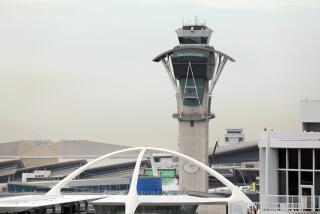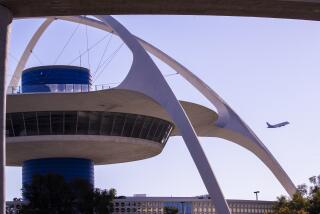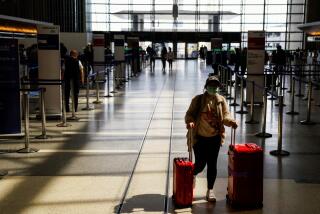Pilot Branded a ‘Hooligan’ at Moscow Trial : Prosecutor Seeks 8-Year Term for Rust
- Share via
MOSCOW — A Soviet prosecutor Thursday branded young West German pilot Mathias Rust a “hooligan” and asked that he be sentenced to eight years in a strict-regime prison camp for his Helsinki-to-Moscow flight last May. A panel of the Soviet Supreme Court is expected to reach a verdict and pronounce a sentence today.
Rust, the 19-year-old who caused a sensation by landing his light plane just outside the Kremlin wall, showed no emotion when the prosecutor proposed the sentence. Rust has acknowledged that his unauthorized flight was in violation of Soviet law, but he said he was on a “mission of peace.”
No matter how severe the sentence, Soviet officials said privately that Rust is likely to be released within a year in some form of prisoner exchange.
The prosecution recommended the eight-year sentence on the major charge--violation of flight regulations. It also asked for a four-year term on a charge of “malicious hooliganism” and two years on a charge of illegal entry into the Soviet Union. Customarily, such sentences are served concurrently.
“Although he is not yet 20, he understood that he was risking his own life and the lives of others,” prosecutor Vladimir Andreyev said in his summation. “The law is the law, in the Soviet Union as in West Germany. He is a hooligan.”
According to Tass, the Soviet news agency, Andreyev challenged Rust’s statement that he had come to Moscow in an attempt to see Soviet leader Mikhail S. Gorbachev and discuss ways to reduce East-West tension. He asked Rust what he planned to do after landing.
“I didn’t have a clear idea of what would happen next,” Tass quoted Rust as saying. “My aim was to contact the country’s leadership. But I did not know how to do that.”
Close to Airliner
At one point last May 28, the prosecutor said, Rust’s plane, a single-engine Cessna, was only 1,500 feet above Moscow’s Sheremetyevo International Airport and came dangerously close to a West German airliner.
“You crossed standard routes by which aircraft arrive and depart at the period of intensive traffic,” the prosecutor said, adding that Rust could have caused a tragic accident.
Rust denied that he was in a prohibited zone and insisted that he was in no danger of colliding with airliners landing or departing from Sheremetyevo.
Presiding Judge Robert G. Tikhomorov read a deposition from a West German tour guide, Guenter Reicher, who said he had talked with the young pilot shortly after the landing.
The deposition said that Rust, when asked why he made the flight, replied, “Simply for fun.” But on the stand Thursday, Rust denied under questioning by the judge that he had made any such remark. He repeated his statement of Wednesday, the day the trial opened, that he had come on a mission of peace.
Rust’s achievement in penetrating the heavily guarded Soviet border and avoiding Soviet air defense forces led to a military shake-up. The defense minister was forced to retire, and several high-ranking officers were dismissed.
For this reason alone, Western diplomats believe, the Soviets cannot be lenient with Rust, even though he caused no damage and has expressed his regret for the incident.
Rust remained impassive Thursday, even during the prosecutor’s closing speech and request for a severe sentence, which is close to the maximum allowed by Soviet law. At times he managed a tight smile.
More to Read
Sign up for Essential California
The most important California stories and recommendations in your inbox every morning.
You may occasionally receive promotional content from the Los Angeles Times.













